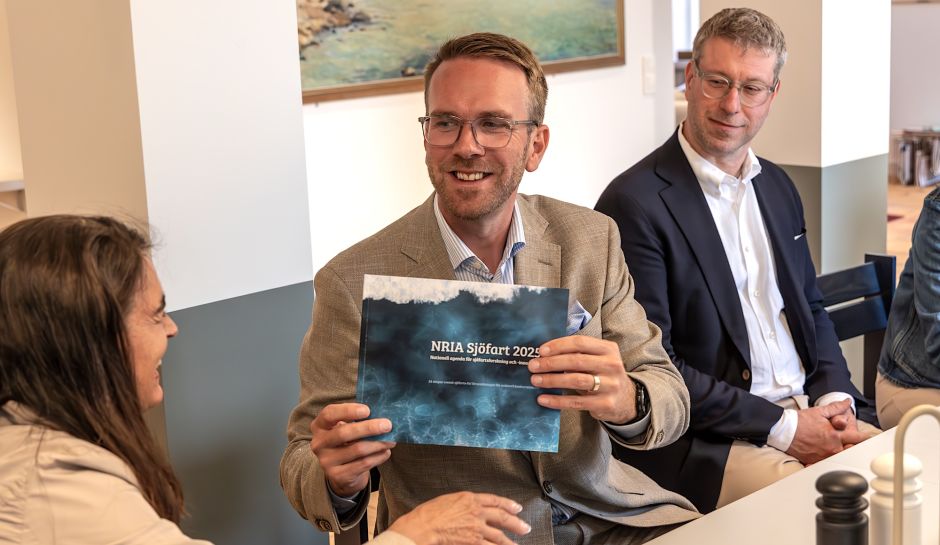Swedish shipping at a critical crossroads – new national agenda for maritime research and innovation points the way toward sustainable competitiveness

The Swedish maritime sector is one of the nation’s most vital yet perhaps least recognized industries. Today, NRIA Shipping 2025 is being published – an update of the national agenda from 2021 – providing clear guidance on how Swedish shipping can become both fossil-free and globally competitive. The agenda, which was presented to Minister for Infrastructure Andreas Carlsson during Almedalen Week, is backed by the sector’s leading stakeholders from industry, academia, and government.
Sweden, in terms of transport, can be regarded as an island. Shipping is essential both for Sweden’s foreign trade and for domestic transport. Yet, shipping holds little place in our collective or media consciousness – it simply works, taken for granted. While many other countries have invested in strengthening their merchant fleets and conditions for shipping, Sweden has not kept pace, leading to a situation where today fewer than 100 vessels fly the Swedish flag – a number that raises concerns for both trade and national preparedness.
“A lot has happened since 2021. Technological development is moving rapidly, while major geopolitical changes and new regulations have been introduced that directly affect Swedish shipping,” says Åsa Burman, Director at Lighthouse, Sweden’s collaborative platform for maritime research.
The new regulations from the EU and the UN’s International Maritime Organization (IMO) require the industry to reduce emissions by at least 20 percent by 2030 and 70 percent by 2040, in order to reach net zero around 2050. This historic transition brings major opportunities for increased export revenues, new business opportunities, and job creation for those at the forefront of development. And Sweden is among them (with examples such as Oceanbird – the world’s first wind-powered car carrier – and Gotland Horizon, the world’s first large-scale hydrogen-powered passenger vessel). But competition is rapidly intensifying, and to avoid losing ground, significant increases in research, innovation, and education investments are required.
“Swedish maritime expertise is of critical importance not only for the shipping sector but also for other industries and, of course, for national preparedness. Research and innovation form the foundation of this – whether we are talking about climate transition, competitiveness in the civilian shipping sector, or our national defense and readiness. I am therefore very pleased that the industry, within the framework of Lighthouse, has united around a common direction for research needs,” says Anders Hermansson, CEO of the Swedish Shipowners´Association.
The agenda proposes, among other things:
- that the government’s earmarked funding for maritime R&D be at least doubled within three years, and subsequently increased further.
- that relevant education and training for the sector be secured and prioritized in the education system.
- that maritime competence be strengthened within government agencies, ministries, and public administration.
- that conditions be created for smoother mobility and knowledge transfer between sea and land, as well as between civilian and military shipping.
- that the government earmark revenues from the fees that shipping pays into the EU Emissions Trading System (EU ETS) for reinvestment in the industry’s transition.
Images: Representatives of the maritime sector present NRIA Shipping 2025 to Minister for Infrastructure Andreas Carlsson during Almedalen Week in June.
Photographer: Christopher Kullenberg Rothvall, Sjöfartstidningen.
-
 Ny studie: Eldrivna pendelbåtar kan effektivisera Stockholms kollektivtrafik
Ny studie: Eldrivna pendelbåtar kan effektivisera Stockholms kollektivtrafik -
 EU: Sjöfartens utsläpp ökar
EU: Sjöfartens utsläpp ökar -
 Sociala relationer påverkar val av bränsle
Sociala relationer påverkar val av bränsle -
 Sjöfartens omställning kräver ”mjukare” påtryckningar
Sjöfartens omställning kräver ”mjukare” påtryckningar -
 Hon hade avtalad tid med Kapten ynkrygg
Hon hade avtalad tid med Kapten ynkrygg -
 Lighthouse omvärldsanalys 2025 – osäkerhet och tullar präglar sjöfarten
Lighthouse omvärldsanalys 2025 – osäkerhet och tullar präglar sjöfarten -
 Se seminariet Shipping in the Marine Environment
Se seminariet Shipping in the Marine Environment -
 Vad betyder egentligen de 90 procenten?
Vad betyder egentligen de 90 procenten? -
 Hålla där...
Hålla där... -
 Ny rapport: Klimatförändringarna ett hot mot de flesta större hamnar i världen
Ny rapport: Klimatförändringarna ett hot mot de flesta större hamnar i världen

